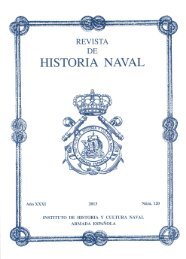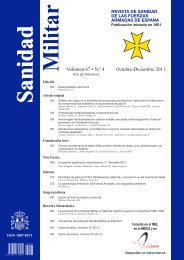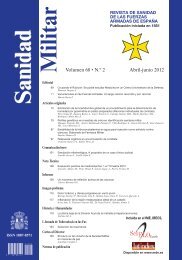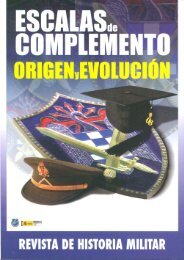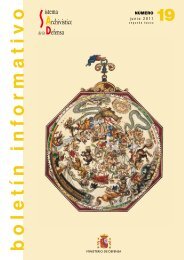El rey Rodrigo y su concepto de la fuerza - Portal de Cultura de ...
El rey Rodrigo y su concepto de la fuerza - Portal de Cultura de ...
El rey Rodrigo y su concepto de la fuerza - Portal de Cultura de ...
You also want an ePaper? Increase the reach of your titles
YUMPU automatically turns print PDFs into web optimized ePapers that Google loves.
154<br />
ABSTRACT<br />
ROBERTO QUIRÓS ROSADO<br />
The importance of Hispanic Antiquity during Early Mo<strong>de</strong>rnity can<br />
observe into a small dramatic je<strong>su</strong>itic p<strong>la</strong>y published in Brussels in 1665:<br />
C<strong>la</strong>udio pío, fuerte y fiel governador <strong>de</strong> Portugal, en nombre <strong>de</strong>l cathólico<br />
Recaredo, <strong>rey</strong> <strong>de</strong> España. The life of Hispanorroman dux C<strong>la</strong>udius<br />
of Mérida, loyal servent of Visigothic king Reccaredus, turns into an inspiration<br />
source by the p<strong>la</strong>y’s writer and other Humanistic and Baroque<br />
authors who will make with that plot several discourses and reflections<br />
about the political validity of Catholic Monarchy and Portuguese Restauração.<br />
KEY WORDS: C<strong>la</strong>udius of Mérida, Late Antiquity, Early Mo<strong>de</strong>rnity,<br />
propaganda, historiography, je<strong>su</strong>itic theater, fidalgos, Portugal.<br />
* * * * *<br />
En <strong>la</strong>s postrimerías <strong>de</strong> <strong>su</strong> vida, Francisco <strong>de</strong> Moura y Corte-Real, marqués<br />
<strong>de</strong> Castelo <strong>Rodrigo</strong>, elevaba a Carlos II <strong>de</strong> España, todavía tute<strong>la</strong>do<br />
por <strong>la</strong> reina viuda Mariana <strong>de</strong> Austria, un breve memorial en<br />
que recordaba “por mayor los servicios que mis padres, abuelos y yo hemos<br />
hecho a los <strong>de</strong> Vuestra Magestad, por los quales hemos merecido ocupar los<br />
mayores puestos en <strong>la</strong> Monarquía, obrando en ellos con <strong>la</strong> satisfación notoria<br />
al mundo” 3 . En el escrito, don Francisco hacía cuenta <strong>de</strong> <strong>la</strong>s <strong>de</strong>sgracias<br />
que <strong>su</strong> linaje había <strong>su</strong>frido tras <strong>la</strong> <strong>su</strong>blevación portuguesa <strong>de</strong> diciembre <strong>de</strong><br />
1640, <strong>su</strong>ceso que provocaría <strong>la</strong> progresiva <strong>de</strong>snaturalización <strong>de</strong> <strong>su</strong> persona y<br />
casa —si bien, contra <strong>su</strong> voluntad— respecto al reino luso 4 . La razón directa<br />
<strong>de</strong> todo ello provenía <strong>de</strong> <strong>la</strong> lealtad que los Moura mantuvieron a <strong>la</strong> causa <strong>de</strong><br />
3 Biblioteca <strong>de</strong> <strong>la</strong> Real Aca<strong>de</strong>mia <strong>de</strong> <strong>la</strong> Historia (RAH), Colección Sa<strong>la</strong>zar y Castro, U-6, ff. 274r-<br />
275v; MOURA Y CORTE-REAL, F. <strong>de</strong> (III marqués <strong>de</strong> Castelo <strong>Rodrigo</strong>): Papel <strong>de</strong>l marqués <strong>de</strong><br />
Castel <strong>Rodrigo</strong> al Rey nuestro Señor [Madrid, 22-XI-1675]. En el memorial, don Francisco pedía<br />
al soberano “que continuara en mis here<strong>de</strong>ros, y en particu<strong>la</strong>r en mi hija, <strong>la</strong> con<strong>de</strong>sa <strong>de</strong> Lumiares,<br />
y en <strong>su</strong> marido, el con<strong>de</strong>, <strong>la</strong>s honrras y merce<strong>de</strong>s que hasta ahora hemos recivido <strong>de</strong> <strong>su</strong>s gloriosos<br />
progenitores <strong>de</strong> Vuestra Magestad”, petición que sería atendida por el soberano al nombrar a<br />
Anielo <strong>de</strong> Guzmán, IV marqués <strong>de</strong> Castelo <strong>Rodrigo</strong>, para el importante puesto <strong>de</strong> vir<strong>rey</strong> <strong>de</strong> Sicilia<br />
en 1676; sobre <strong>la</strong> actuación <strong>de</strong>l vir<strong>rey</strong> Castelo <strong>Rodrigo</strong> en el gobierno <strong>de</strong> Sicilia, vid. RIBOT, L.,<br />
La Monarquía <strong>de</strong> España y <strong>la</strong> guerra <strong>de</strong> Mesina (1674-1678), Madrid, 2002, p. 98 y ss.<br />
4 MARTÍNEZ HERNÁNDEZ, S.: “Fineza, lealtad y zelo”. Estrategias <strong>de</strong> legitimación y ascenso <strong>de</strong><br />
<strong>la</strong> nobleza lusitana en <strong>la</strong> Monarquía Hispánica: los Marqueses <strong>de</strong> Castelo <strong>Rodrigo</strong> (1582-1675)”,<br />
en RIVERO RODRÍGUEZ, M. (Coord.): Nobleza Hispana, Nobleza Cristiana, vol. II, Madrid,<br />
2009, pp. 913-960.



